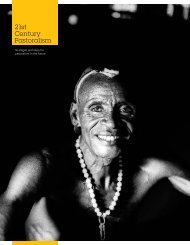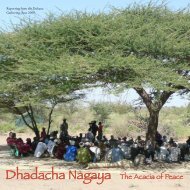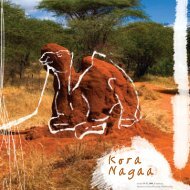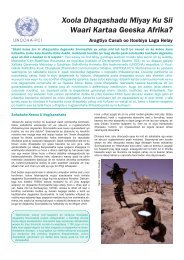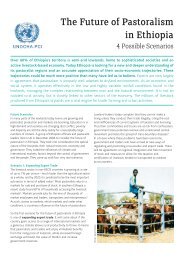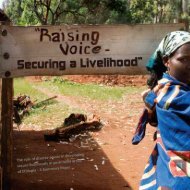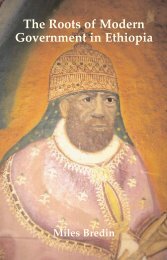Download PDF (1.47Mb) - the Website of the Pastoralist ...
Download PDF (1.47Mb) - the Website of the Pastoralist ...
Download PDF (1.47Mb) - the Website of the Pastoralist ...
Create successful ePaper yourself
Turn your PDF publications into a flip-book with our unique Google optimized e-Paper software.
ABOUT<br />
THE KARAMOJA<br />
RESEARCH<br />
4. Finding <strong>the</strong> topic and setting <strong>the</strong> questions<br />
“We began our training in designing action research by telling stories about our<br />
lives, which let us understand each o<strong>the</strong>r’s experiences and interests and<br />
make friends with each o<strong>the</strong>r. We identified our topic from our stories, ‘strength,<br />
creativity and livelihoods <strong>of</strong> youth in Karamoja’.”<br />
Action research is different from o<strong>the</strong>r kinds <strong>of</strong> social research in that it recognises that <strong>the</strong> point <strong>of</strong> view <strong>of</strong><br />
<strong>the</strong> researchers is as important in <strong>the</strong> findings as <strong>the</strong> points <strong>of</strong> view <strong>of</strong> o<strong>the</strong>rs who contribute information. The<br />
researchers’ own frame <strong>of</strong> reference is made explicit at all stages.<br />
Stories are a good way to introduce people to one ano<strong>the</strong>r and to lay <strong>the</strong> foundation for agreements about<br />
purpose and topic. They can encourage openness, listening and respect in building a team and its skills. They allow<br />
listeners to hear points <strong>of</strong> convergence and difference. Story telling can give a good basis for working toge<strong>the</strong>r.<br />
In Moroto, <strong>the</strong> facilitators looked for a meeting place where each member <strong>of</strong> <strong>the</strong> team would feel at ease. They<br />
made sure that <strong>the</strong> food was right and that tea came at frequent intervals. Then <strong>the</strong>y asked <strong>the</strong> newly assembled<br />
team to tell a short story from <strong>the</strong>ir life to show a little <strong>of</strong> who <strong>the</strong>y are, what makes <strong>the</strong>m strong, what <strong>the</strong>y care<br />
about, and what brought <strong>the</strong>m to join <strong>the</strong> team.<br />
The facilitators encouraged <strong>the</strong> group members to ask questions after each story. They urged <strong>the</strong>m to recognise<br />
which questions are open and increase understanding and which contain judgement and close down<br />
understanding.<br />
“Stories mean listening to each o<strong>the</strong>r and trying to understand. When one<br />
person tells <strong>the</strong> story, <strong>the</strong> o<strong>the</strong>rs were listening and were able to give back<br />
what <strong>the</strong>y heard. There was openness – when someone was telling <strong>the</strong> story<br />
<strong>the</strong>y weren’t fearing <strong>the</strong> members so <strong>the</strong>y could just say what <strong>the</strong>y felt. They<br />
knew <strong>the</strong> members wouldn’t say anything bad to <strong>the</strong>m about <strong>the</strong>ir story.”<br />
After a number <strong>of</strong> stories had been told, and <strong>the</strong>n again at <strong>the</strong> end, <strong>the</strong> facilitators asked <strong>the</strong> following questions<br />
to identify <strong>the</strong> research topic and research questions:<br />
• What was <strong>the</strong> common thread in <strong>the</strong> stories?<br />
• What topics aroused <strong>the</strong> most discussion and energy in <strong>the</strong> group?<br />
• What were <strong>the</strong> questions that seemed to be calling out from <strong>the</strong> stories?<br />
• Which topics and questions could form <strong>the</strong> basis <strong>of</strong> our research inquiry?<br />
- 9 -



